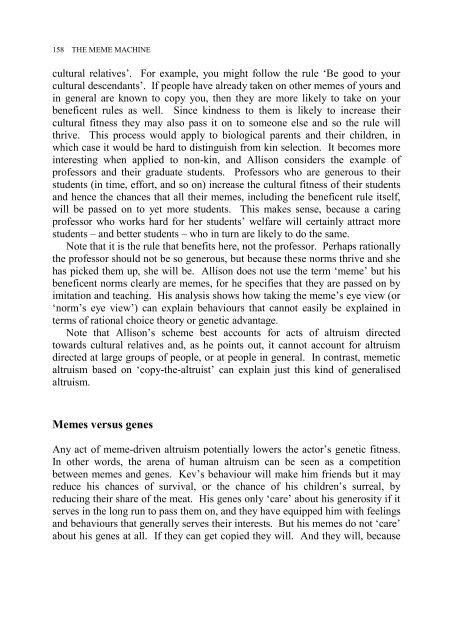The Meme Machine
TheMemeMachine1999
TheMemeMachine1999
- No tags were found...
Create successful ePaper yourself
Turn your PDF publications into a flip-book with our unique Google optimized e-Paper software.
158 THE MEME MACHINE<br />
cultural relatives’. For example, you might follow the rule ‘Be good to your<br />
cultural descendants’. If people have already taken on other memes of yours and<br />
in general are known to copy you, then they are more likely to take on your<br />
beneficent rules as well. Since kindness to them is likely to increase their<br />
cultural fitness they may also pass it on to someone else and so the rule will<br />
thrive. This process would apply to biological parents and their children, in<br />
which case it would be hard to distinguish from kin selection. It becomes more<br />
interesting when applied to non-kin, and Allison considers the example of<br />
professors and their graduate students. Professors who are generous to their<br />
students (in time, effort, and so on) increase the cultural fitness of their students<br />
and hence the chances that all their memes, including the beneficent rule itself,<br />
will be passed on to yet more students. This makes sense, because a caring<br />
professor who works hard for her students’ welfare will certainly attract more<br />
students – and better students – who in turn are likely to do the same.<br />
Note that it is the rule that benefits here, not the professor. Perhaps rationally<br />
the professor should not be so generous, but because these norms thrive and she<br />
has picked them up, she will be. Allison does not use the term ‘meme’ but his<br />
beneficent norms clearly are memes, for he specifies that they are passed on by<br />
imitation and teaching. His analysis shows how taking the meme’s eye view (or<br />
‘norm’s eye view’) can explain behaviours that cannot easily be explained in<br />
terms of rational choice theory or genetic advantage.<br />
Note that Allison’s scheme best accounts for acts of altruism directed<br />
towards cultural relatives and, as he points out, it cannot account for altruism<br />
directed at large groups of people, or at people in general. In contrast, memetic<br />
altruism based on ‘copy-the-altruist’ can explain just this kind of generalised<br />
altruism.<br />
<strong>Meme</strong>s versus genes<br />
Any act of meme-driven altruism potentially lowers the actor’s genetic fitness.<br />
In other words, the arena of human altruism can be seen as a competition<br />
between memes and genes. Kev’s behaviour will make him friends but it may<br />
reduce his chances of survival, or the chance of his children’s surreal, by<br />
reducing their share of the meat. His genes only ‘care’ about his generosity if it<br />
serves in the long run to pass them on, and they have equipped him with feelings<br />
and behaviours that generally serves their interests. But his memes do not ‘care’<br />
about his genes at all. If they can get copied they will. And they will, because



